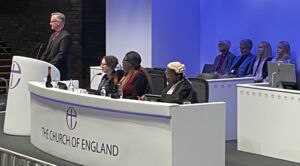Address to the Synod of York
5.7.2024

Your Graces, Mr Dean, My Lord and Lady Bishops, Mr and Madam Archdeacons, respected clergy and laity.
It is a great honour and pleasure to stand before you to greet you all in the name of our Lord Jesus Christ. I cannot help mentioning that this is not the first time I have addressed a synod on British soil. Almost exactly 30 years ago, in May 1994, as a young Lutheran priest and doctoral student preparing my dissertation in Britain, I stood in Saint Mary’s Cathedral in Edinburgh to participate in the General Synod of the Scottish Episcopal Church. I had been invited to give a short speech at the synod on one of the issues on its agenda, namely whether or not to join the Porvoo Agreement. I have no idea of the possible impact of my speech, but in any case, the Scottish Episcopal Church was the first church in the Anglican tradition to agree to join the Porvoo Communion. That happened later in 1994. Both my own church and the Church of England followed a year later, in 1995.
From the Lutheran perspective the 1990s were a time of significant ecumenical milestones. The Porvoo Agreement was one of them. Thanks to it, we – Anglican and Lutheran sisters and brothers – entered into a very unique communion with each other. Another milestone was the Joint Declaration on the Doctrine of Justification between the Lutheran World Federation and the Roman Catholic Church in 1999. This was a sign that the prejudices and tensions of past centuries had dissipated in relations between the Roman Catholic and Lutheran churches.
In Finland we have a long and vigorous tradition of ecumenical cooperation. A symbol of this is the ecumenical pilgrimage to Rome on Saint Henry’s day early each year. Bishops from each tradition – one Lutheran, one Orthodox, and one Catholic – worship together in the Vatican and meet the pope in a private audience. Another symbol is that the last two Catholic bishops’ consecrations in Finland have been held in a Lutheran church.
One of the special features of Finnish society is that we have two established churches, Lutheran and Orthodox. Our long friendship with the Orthodox Church of Finland has also given us an opportunity to build relations with the Ecumenical Patriarchate. In addition we have had bilateral theological discussions with the Russian Orthodox Church, which lasted half a century until those relations were put on ice after Russia’s illegal attack on Ukraine. Then there are our relations with other Protestant churches such as the Methodists, Baptists, Pentecostals, and others. However, the relationship with the Anglican Church is special because we do not enjoy full communion with any other denomination. Through the Porvoo Agreement we form a single family.
The Finnish Evangelical Lutheran Church has gained much as a result of ecumenical convergence. We have maintained our own tradition and confessional basis, but at the same time we have adopted much from the Anglican, Catholic, and Orthodox churches. This is especially visible in our liturgy, which has seen strong renewal in recent decades. Our appreciation of the liturgy has increased, and we have been influenced by our ecumenical sister churches in music, prayer life, liturgical vestments, processions – and even the colour of the bishop’s shirt.
I remember thinking when I was listening to the concerns of the Scottish Episcopal Church 30 years ago that rapprochement with one church did not mean turning one’s back on others. Nor does it mean endangering one’s own church. Responsible ecumenism seeks a common path that can be walked together so that the tradition, theology, and characteristics of both churches can be respected and cherished.
It is my personal view that ecumenical agreements are not endpoints. The Porvoo Agreement was hugely important for us, the members of the Church of England and the Evangelical Lutheran Church of Finland. We can pray together, serve together, and share the eucharist together. It is important, however, that we do not stop here. We must ask ourselves and each other again and again what this communion means today. How can we work for and bear witness to God in this challenging and complex world together as sisters and brothers in Christ?
May God bless the Church of England and her mission.